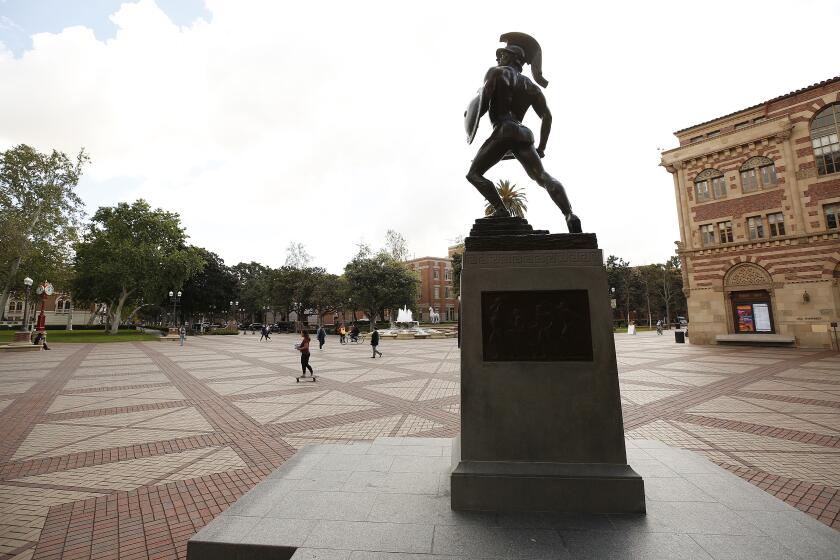Unraveling the fabric of justice in the Brian Banks case
This is a corrected version of the original post; see the note below.
Brian Banks spent more than five years in prison for a rape and kidnapping that, as the courts now find, he did not commit; the repercussions of how the case sorts itself out in the justice system will take a lot longer than that.
There are several threads to follow and figure out in the story of the promising teenaged Long Beach football star who, on his lawyer’s advice, pleaded no contest to the rape charge rather than chance a jury trial and a 40-years-to-life sentence. He was exonerated by a judge last week after his accuser contacted him on Facebook to let bygones be bygones, and admitted that he had not raped her after all.
One thread of this legal tangle is the crapshoot of pleas versus trials. To a teenager, 40 years in prison must look like forever, and the trade-off of a plea deal instead, for a handful of years behind bars, must have seemed the least hopeless of options, never mind that when Banks got out, he was still sentenced to life as a registered sex offender, with an ankle monitor that carried prison with him every day. The California Innocence Project at California Western School of Law, which worked on Banks’ case, says that’s one of the prime reasons the innocent plead guilty -- to avoid a potentially worse sentence, even the death penalty.
Another thread is the nature of the alleged crime itself. High-profile rape cases -- like the Scottsboro Boys, the Duke lacrosse team, William Kennedy Smith, Tawana Brawley and even the fictional one in “To Kill A Mockingbird” -- have encapsulated the gender, race, power and class conflicts in this country.
These play out especially in he-said-she-said testimony in rapes case that, like this one, have no physical evidence. It’s a conundrum that victims’ rights groups have struggled with for years, trying to encourage victims to come forward to report what has historically been one of the most underreported of crimes. How do you weight testimony when testimony is all there is in a case? Decades ago, judges routinely instructed jurors to keep in mind that the charge of rape is easily made and difficult to defend against, and the law required that they use caution in considering the testimony “of the female person” -- the victim.
Victims were not identified in news accounts because being raped somehow made a woman morally complicit, a questionable character -- that maybe she had, in the parlance of the day, “asked” for it. Did she wear a short skirt? A low-cut blouse? Defense attorneys routinely asked questions about the victim’s sexual history, as if it were impossible for a sexually active woman to be raped, as if there were no difference between consensual sex and forced sex.
Just this month, the Nebraska Supreme Court ruled that a woman who refused to testify against a man she accused of sexual assault can herself be jailed for contempt. She had cited a state law that lets people refuse to testify if they think they’ll be publicly disgraced, but the Nebraska courts said that doesn’t apply to criminal cases.
And then there’s the third thread. The money. Follow the money, as the Watergate reporters Bob Woodward and Carl Bernstein were admonished. Banks’ accuser, Wanetta Gibson, and her family received a $750,000 settlement from the Long Beach Unified School District, where both she and Banks were students. According to Banks and his investigator, Gibson didn’t want to admit to authorities about having lied lest she have to return the money. The Times reported that the county has tried to collect child support from Gibson for her two children, who are on public assistance, but officials decided she couldn’t pay because she has no money and no job.
Banks has said he plans to take no legal action against Gibson, but should the school district go through the legal motions of trying to get the money back from Gibson, even though it’s likely to spend more doing so than it could ever recover?
If the district doesn’t at least try to recover the money, does that get marked down as a carte blanche for someone who may not only make a false criminal accusation but then turn around and sue a big-pocketed defendant in civil court on the basis of that criminal finding?
Any way you look at it, the Banks case is one for the books -- or several books. Law books.
[Update, added at 1:17 p.m., May 30, 2012: The name of the organization that worked on Brian Banks’ case was the California Innocence Project at California Western School of Law, not the national Innocence Project.]
RELATED:
How Brian Banks became an innocent man
A judge’s account of jury instructions in rape cases
More to Read
A cure for the common opinion
Get thought-provoking perspectives with our weekly newsletter.
You may occasionally receive promotional content from the Los Angeles Times.











